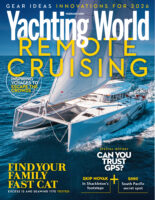Bruno Peyron and team slice nine hours off North Atlantic record 7/7/06
Orange II crossed the finishing line at The Lizard last night at 19h24 GMT and shattered the North Atlantic speed.
Setting out from New York on Sunday 2 July, Bruno Peyron and his maxi catamaran with 11 crewmen crossed the North Atlantic in 4 days, 8 hours, 23 minutes and 54 seconds at an average speed above 27 knots via the theoretical route. The Orange II Dream Team improved on the record set by Steve Fossett’s PlayStation by 9 hours 4 minutes and 12 seconds, a record that was said to be unbeatable. Here are some of Bruno Peyron’s first reactions a few seconds after he crossed the finish:
Your first feeling?
“It’s immense joy…There are smiles on all the tired faces. It’s only normal as we have given it our all and sometimes in life doing your utmost is a good thing. We’re focused on what is happening at the moment. For me, that makes three Jules Verne Trophies and three Atlantic records. What I like too is the way it happened. Things went exactly as planned. The whole crew reacted just right and at the right moment. We hit a bit of ice. I think at least that that was what it was. But we reacted correctly. The boat is ‘wounded’ but in one piece and safe, so we can be proud of our work. It all feels a bit strange. It’s as if we only set out from New York yesterday.”
Was it an exhausting record?
“It’s a physical record that requires commitment. There weren’t many of us here. We chose to go with a total of 12 in two watches, so automatically that takes a lot of effort. But it’s a pleasant tiredness. On the circumnavigation, it’s rather different, as you have to manage things over a longer period. This time we were in the plane on the eve of setting sail and jet lag or not, we set sail immediately. Moreover we hoped we wouldn’t have too many manoeuvres to do, but we ended up doing 20 or so. We did them with the whole crew out on deck, even at 35kts in the middle of the night in the mist, of course. When the watch ‘on rest’ is woken up twice, it is certainly tiring.”
The damage to the rudder?
“We lost between 6 an 8 hours with this incident with the rudder, but really it’s not that serious, even if we know we could do better and the boat deserved better. But I’ll say it again, it doesn’t really matter. It gives our friends and enemies a bit of a chance to try and beat us? and it will give us another chance to come back and try again, even if it wasn’t deliberate.”
Is it possible to cut the time to below 4 days?
“Without hesitation, yes. When we did our route planning before the collision with the UFO, this bit of ice, we were in the process of setting a time of less than four days. So, I’ll say it again: without hesitation, yes. Crossing in less than four days is possible.”
How do you feel about competition arriving with some new maxis?
“Competition? They have a margin of around ten hours. We could have done it in that time, but I think we have left them around ten hours. I’m pleased the rivals are signing up, as if we are still number one in this sport, we’re going to have to fight to remain at the top. The new crews are very fine teams, very efficient.”
Is it the victory of a group?
“That’s for sure. During the Jules Verne in 1993, I discovered what could happen with a crew. We managed to push this idea of group work with the Orange Sailing team all the way. It is the Dream Team, if you like to call it that? What I mean is we can go without seeing each other for 3, 4 or 6 months, but everything becomes a reflex again after 10 minutes, and that is something magical. When you do a team sport at this level of competition, you have to know how to go all the way, together and in style. Afterwards, it’s life which decides who smiles or not. With us, it almost came to an end with that bit of ice in the middle of the voyage.”
The 24 hour record?
“We were the first to cover 600 miles with a crew, the first at 700 miles and now the first at 750 miles (766 in fact, editor’s note).”



